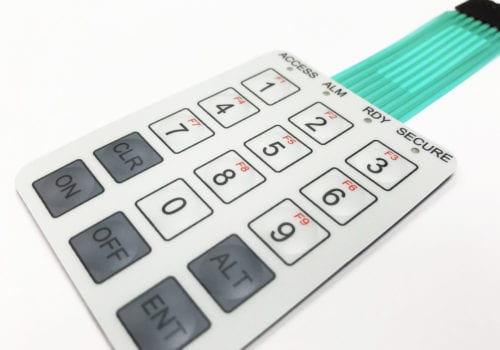How Membrane Switches Are Revolutionizing User Interface Design
How Membrane Switches Are Revolutionizing User Interface Design
Blog Article
Recognizing the Significance of Membrane Switches in Interface
Membrane switches are important components in the design of reliable user interfaces, assisting in not only functionality but likewise improving visual appeal and customer communication. As we explore the numerous benefits and future patterns associated with Membrane modern technology, it becomes clear that these buttons are a lot more than just components; they represent a convergence of innovation and usefulness.
What Are Membrane Buttons?

The spacer layer, which consists of sticky residential properties, enables for the separation of the circuit layer from the overlay, guaranteeing that the switch remains in a non-activated state up until pushed. When pressure is related to the overlay, it presses the spacer layer, connecting the space and finishing the circuit in the underlying layer. This layout not just reduces the physical area required for conventional mechanical buttons yet likewise boosts the durability of the device, as Membrane switches are normally immune to dust, moisture, and various other ecological aspects.
Frequently discovered in applications ranging from consumer electronics to medical tools, Membrane buttons are integral to contemporary technology, offering a effective and easy to use user interface that aligns with modern layout needs.
Benefits of Membrane Switches
While many switch technologies exist, Membrane Switches offer distinct benefits that make them specifically desirable in different applications. One of the primary advantages of Membrane switches is their compact layout, which permits space-saving applications in gadgets where realty is restricted. Their slim profile not only enhances aesthetic charm yet likewise promotes lightweight building.
Another significant advantage is their resistance to environmental variables. Membrane buttons are commonly secured against dampness, dirt, and contaminants, making them excellent for use popular environments, such as clinical gadgets and commercial tools. This longevity expands the lifespan of the button, lowering maintenance expenses and boosting reliability.
Moreover, Membrane buttons can be customized to meet particular layout needs, integrating special graphics and shades that enhance user communication. Their responsive feedback choices can additionally be customized to give a satisfying individual experience. Additionally, Membrane switches are cost-effective, particularly in high-volume applications, as they can be generated successfully.
Applications in Different Industries

In the consumer electronic devices market, Membrane switches prevail in devices such as microwaves, cleaning makers, and push-button controls. Their tactile responses and aesthetic alternatives boost user experience while supplying a streamlined, contemporary look. In addition, automobile suppliers make use of Membrane buttons in dashboard controls and infotainment systems, where area is restricted, and individual involvement is critical.
Additionally, the industrial sector leverages Membrane switches in control panels for machinery and tools, permitting instinctive operation in frequently rough environments. Their resistance to chemicals and moisture guarantees long life and reliability in these applications. In general, the versatility of Membrane Switches contributes considerably to their extensive use, making them essential in various technical domains.
Layout Considerations for Membrane Buttons

When making Membrane buttons, several vital factors to consider have to be thought about to make certain optimum functionality and user experience. The choice of materials is critical; picking sturdy, high-quality substrates can enhance the switch's longevity and resistance to ecological variables such as moisture and temperature variations.
Secondly, the layout of the graphic overlay ought to focus on clarity and convenience of usage. Icons and text have to be understandable, and the format ought to promote user-friendly communication (membrane switches). Furthermore, responsive comments is essential; including a tactile dome or other devices can enhance the individual experience by offering physical confirmation of activation
Another important element is the button's electrical efficiency. Developers have to guarantee that the conductive traces are appropriately created to lessen resistance and prevent signal disturbance. This involves analyzing the needed actuation force and making certain compatibility with the digital components they will certainly interface with.

Future Fads in Membrane Technology
As innovation remains to breakthrough, Membrane switches are poised to progress significantly, driven by technologies in materials and making methods. One arising pattern is the consolidation of advanced products, such as adaptable substrates and conductive inks, which boost toughness and reduce the overall weight of Membrane switches. These materials not just enhance the responsive reaction yet additionally enable the design of buttons that can hold up against harsher use this link ecological problems.
Moreover, the combination of touch-sensitive technologies is transforming traditional Membrane Switches right into even more interactive interface. Capacitive touch sensors installed within Membrane switch panels can supply an extra responsive and user-friendly user experience, aligning with the expanding need for sleek, modern-day layouts in customer electronics.
Furthermore, improvements in printing strategies, such as electronic and 3D printing, make it possible for quick prototyping and customization of Membrane buttons. This flexibility allows producers to react a lot more swiftly to market demands and customer preferences.
Lastly, sustainability is becoming a substantial emphasis, with producers discovering environmentally friendly products and procedures. As these trends unfold, the future of Membrane innovation guarantees enhanced functionality, visual allure, and ecological responsibility, strengthening their role in sophisticated interface across various markets.
Conclusion
In verdict, Membrane Switches stand for an essential part in the layout of user interfaces, incorporating capability with aesthetic versatility. As innovations in innovation proceed, the evolution of Membrane buttons is anticipated to additional improve individual interfaces, driving advancement and boosting functionality in a progressively intricate technological landscape.
Membrane buttons are essential elements in the style of web link reliable individual interfaces, promoting not just performance however additionally improving aesthetic charm and customer interaction.Membrane Switches serve as an essential element in different customer interfaces, assisting in a seamless interaction in between users and electronic gadgets.While various button innovations exist, Membrane Switches offer distinctive benefits that make them especially preferable in various applications.Moreover, Membrane buttons can be personalized to meet certain style demands, integrating distinct graphics and colors that improve user communication.In conclusion, Membrane Switches represent a vital element in the style of customer More Bonuses interfaces, incorporating functionality with visual adaptability.
Report this page